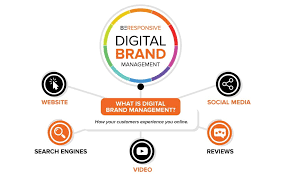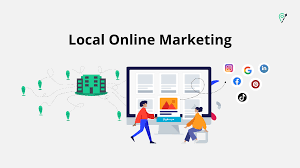Digital Marketing for Beginners
Digital marketing is a powerful tool for businesses of all sizes to reach their target audience and grow their online presence. If you’re new to the world of digital marketing, it can seem overwhelming at first. However, with the right guidance and strategies, you can effectively promote your brand and engage with potential customers. Here are some key concepts to help beginners navigate the realm of digital marketing:
Understanding Digital Marketing
Digital marketing encompasses various online tactics and channels to promote products or services. It includes activities such as search engine optimisation (SEO), social media marketing, email marketing, content creation, pay-per-click advertising, and more. The goal is to connect with your target audience in the digital space and drive conversions.
Key Components of Digital Marketing
Website: Your website is the cornerstone of your online presence. Ensure it is user-friendly, mobile-responsive, and optimised for search engines.
SEO: Search engine optimisation helps improve your website’s visibility in search engine results pages (SERPs) by targeting relevant keywords and creating high-quality content.
Social Media: Utilise social media platforms like Facebook, Instagram, Twitter, and LinkedIn to engage with your audience, share valuable content, and promote your products or services.
Email Marketing: Build an email list and send targeted campaigns to nurture leads, promote offers, and stay connected with customers.
Tips for Beginners
Define Your Goals: Determine what you want to achieve through digital marketing – whether it’s increasing brand awareness, driving website traffic, or generating leads.
Know Your Audience: Understand your target market’s preferences, behaviours, and demographics to tailor your digital marketing efforts effectively.
Test and Learn: Experiment with different strategies, analyse the results, and refine your approach based on what works best for your business.
Conclusion
Digital marketing offers endless opportunities for businesses to connect with their audience in a meaningful way. By understanding the key concepts and implementing effective strategies, beginners can set a strong foundation for successful online marketing campaigns. Remember that consistency and adaptability are key in the ever-evolving landscape of digital marketing.
Essential FAQs: A Beginner’s Guide to Digital Marketing
- What is digital marketing and why is it important?
- What are the key components of a digital marketing strategy?
- How can I improve my website’s search engine ranking?
- What social media platforms should I focus on for my business?
- How do I start with email marketing and build an email list?
- What is the role of content in digital marketing?
- How can pay-per-click (PPC) advertising benefit my business?
- What analytics tools can help me measure the success of my digital marketing campaigns?
- How do I create a budget for digital marketing activities?
What is digital marketing and why is it important?
Digital marketing is a vital aspect of modern business strategy that utilises various online channels to promote products or services and engage with target audiences. Its importance lies in the ability to reach a vast number of potential customers in the digital space, allowing businesses to connect with their audience in a more targeted and cost-effective manner than traditional marketing methods. By leveraging digital marketing techniques such as SEO, social media, email campaigns, and content creation, businesses can increase brand visibility, drive website traffic, generate leads, and ultimately boost sales and revenue. In today’s digital age, having a strong digital marketing strategy is essential for staying competitive and building a successful online presence.
What are the key components of a digital marketing strategy?
When delving into the realm of digital marketing as a beginner, understanding the key components of a digital marketing strategy is crucial. These components typically include a well-designed website that is optimised for search engines (SEO), engaging social media presence, targeted email marketing campaigns, compelling content creation, pay-per-click advertising, and data analytics to measure performance. Each element plays a vital role in reaching and engaging with the target audience effectively, driving conversions, and ultimately achieving the desired business objectives. By incorporating these key components into a cohesive digital marketing strategy, beginners can establish a strong foundation for success in the online landscape.
How can I improve my website’s search engine ranking?
Improving your website’s search engine ranking is crucial for increasing visibility and attracting organic traffic. To enhance your website’s search engine ranking, focus on implementing effective search engine optimisation (SEO) strategies. This includes conducting keyword research to target relevant terms, creating high-quality and engaging content, optimising meta tags and descriptions, improving website loading speed, building quality backlinks from reputable sources, and ensuring mobile responsiveness. Regularly monitoring and analysing your website’s performance using tools like Google Analytics can also help you identify areas for improvement and refine your SEO efforts to boost your search engine ranking.
What social media platforms should I focus on for my business?
When it comes to determining the social media platforms to focus on for your business in the realm of digital marketing, it is essential to consider your target audience and the nature of your products or services. Each social media platform caters to different demographics and user behaviours. For instance, if your business targets a younger audience, platforms like Instagram and TikTok may be more suitable due to their visual and interactive nature. On the other hand, LinkedIn might be ideal for B2B businesses looking to connect with professionals in their industry. It is crucial to research and analyse where your target audience spends their time online to make informed decisions on which platforms will best serve your business goals.
How do I start with email marketing and build an email list?
To start with email marketing and build an email list as a beginner, it is essential to follow a structured approach. Begin by selecting an email marketing platform that suits your needs and allows for easy management of campaigns and subscriber lists. Create valuable and engaging content that resonates with your target audience to encourage them to subscribe to your emails. Utilise various channels such as social media, website pop-ups, and incentives like exclusive offers or content upgrades to attract subscribers. Remember to comply with data protection regulations such as GDPR when collecting and storing email addresses. Consistent communication, segmentation of your email list, and monitoring of performance metrics will help you refine your email marketing strategy over time for optimal results.
What is the role of content in digital marketing?
In the realm of digital marketing, content plays a pivotal role in engaging and connecting with target audiences. High-quality and relevant content serves as the foundation for various digital marketing strategies, including SEO, social media, email marketing, and more. Compelling content not only attracts potential customers but also educates, informs, and entertains them, building trust and credibility for your brand. From blog posts and videos to social media updates and email newsletters, well-crafted content has the power to drive traffic to your website, increase brand visibility, and ultimately convert leads into loyal customers. In essence, content is the driving force behind successful digital marketing campaigns that resonate with audiences and deliver tangible results.
How can pay-per-click (PPC) advertising benefit my business?
Pay-per-click (PPC) advertising can greatly benefit your business by providing a targeted and cost-effective way to reach potential customers online. With PPC ads, you only pay when someone clicks on your ad, making it a measurable and efficient marketing strategy. By carefully selecting keywords, targeting specific audiences, and setting a budget that works for you, PPC advertising can drive relevant traffic to your website, increase brand visibility, and ultimately lead to higher conversions. Additionally, the ability to track and analyse the performance of your PPC campaigns allows you to make data-driven decisions to optimise your advertising efforts for maximum ROI.
What analytics tools can help me measure the success of my digital marketing campaigns?
When delving into digital marketing as a beginner, a common question arises: “What analytics tools can help me measure the success of my digital marketing campaigns?” Tracking the performance of your campaigns is crucial for understanding their impact and making data-driven decisions. Popular analytics tools like Google Analytics, Adobe Analytics, and HubSpot provide valuable insights into website traffic, user behaviour, conversion rates, and more. By leveraging these tools effectively, beginners can gain a comprehensive understanding of their digital marketing efforts and optimise strategies for better results.
How do I create a budget for digital marketing activities?
Creating a budget for digital marketing activities is a crucial step for beginners looking to establish their online presence effectively. Start by defining your goals and objectives, whether it’s increasing website traffic, generating leads, or boosting brand awareness. Consider allocating funds to different channels such as social media advertising, search engine optimisation, content creation, and email marketing based on your target audience and marketing strategy. It’s essential to track the performance of each activity and adjust your budget accordingly to maximise your return on investment. Remember that flexibility and experimentation are key in finding the right balance between cost-effectiveness and achieving your digital marketing goals.



